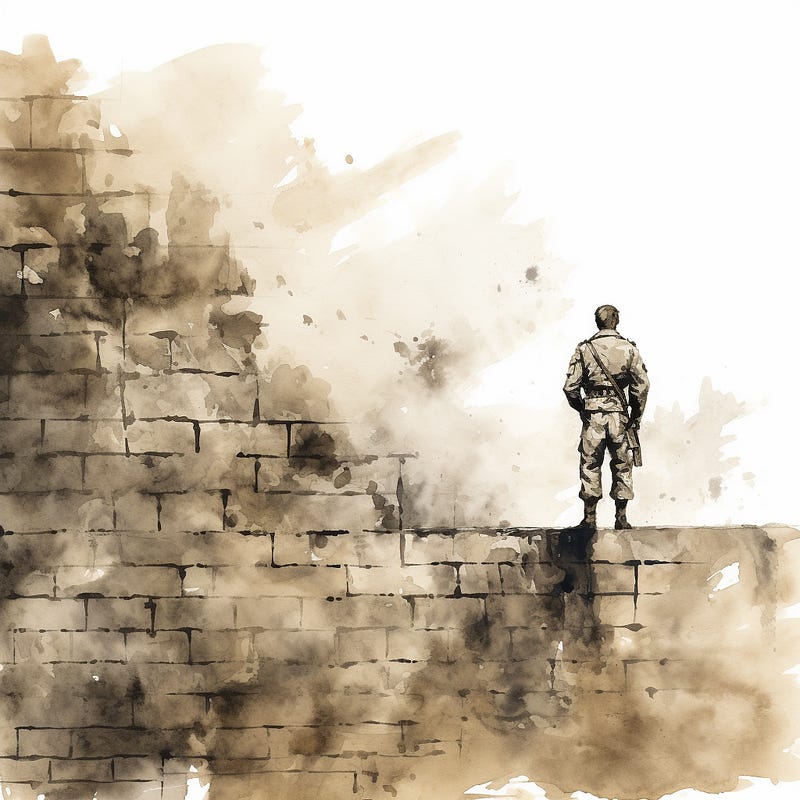Border Defense — Do Our Psychic Bastions Even Exist?
The root cause why our defense system doesn’t activate as it should
Many times, I’ve been in situations where someone overstepped my boundaries. Yet, I didn’t activate my defenses. Usually, I would just endure the situation, trying to put on a brave face, hoping to avoid conflict. The conflict which wasn’t my doing but caused by the other person’s insensitivity or malice. For a long time, I felt there was nothing wrong with this. After a few days, I’d move on. I never considered how much trouble and tension I caused myself during those days. I never thought about how I perpetuated situations that were already miserable to experience. As for why I couldn’t defend myself, I had no answer.
Then, after reading many books about assertiveness, I began to realize I have every right to defend myself. The only question was, how? Because in those tense moments, even with a gun to my head, I couldn’t be persuaded to stand up for myself against insults, the tone, or to say, “excuse me, but it’s none of your business how much the home renovation cost.” Self-defense remained a theory, which I learned well from self-help books but couldn’t put into practice. Every time I tried, I hit a wall. A wall I built inside myself long ago, so long that I no longer recognized the bricks I once laid.
Much reading and different introspection techniques were required before I realized who the mason was and the intention behind building that wall. Once I figured it out, a massive weight lifted from my heart. I realized that when defending my boundaries, I was, in fact, fearing for my life. Not in the moment when the neighbor asked about the renovation costs, but much earlier, in my infancy. The problem was that a baby interprets the world differently than an adult.
Let’s see how childhood trauma affects us in adulthood!
A baby defends its boundaries by crying because it has no other means. If it feels bothered, it cries; if it doesn’t want to bathe, it cries; if it feels lonely, it cries; if unfamiliar Aunt Lilly gets too close, it cries. Parents, of course, have to be intuitive, as deciphering the exact cause of the crying can be challenging.
When I was about six months old, I received a vaccination. The pediatrician came to our house to administer the injection. I don’t know exactly what happened, but I began to cry bitterly. After the doctor left, my parents were left with a wailing baby. My crying grew more intense, and I began to choke, then started turning blue from lack of oxygen. My parents were in total despair. With no mobile phones back then, and competing for the landline with another family in the building, my father decided there wasn’t enough time to wait for an ambulance. He first took me out for fresh air, but as I turned bluer, he put me under cold water in the bathtub. This shocked me so much that I stopped crying and took a deep breath. I finally started to breathe normally. My color returned, and the incident became a part of family lore. As an adult, I see and understand that my father, with the best intentions and, fortunately, great presence of mind, managed a situation that could have killed me. The problem is that my body and subconscious stored this whole incident differently.
The infant stored this as a lesson: even if its boundaries are crossed, even if something is unbearably uncomfortable, it’s better to remain silent; otherwise, it faces mortal danger and is put into freezing cold water. Yes, I know that cold water isn’t fatal, but a vulnerable baby weighing three to four kilograms perceives it differently. This experience deeply ingrained itself into my being.
I wasn’t consciously aware of the effects of this experience on me, even though I had heard the story many times. I never pondered how I might have lived through it and what imprint it could’ve left within me. That was until the connection between the event and its impact became conscious.
It was then that I realized why the books and articles on assertiveness didn’t help me defend myself. I understood that the barrier holding me back was one I had unconsciously built myself. Once it became clear that in these situations the old fear was just resurfacing, and that I didn’t need to fear for my life in the current situation, things became much easier. I finally gave myself permission to defend myself or if I didn’t like a situation, to walk away.
The tools I learned from books and articles then became very useful, and though I needed — and occasionally still need — some practice, I now have a functional defense system. The funny thing is, it’s as if others can see these imaginary bastions. I have to express my boundaries much less frequently because most of the time, they’re respected even without being stated. If we’ve tried every tool we know and keep hitting a wall, it might be worth seeking methods that help uncover our subconscious experiences.
– Eszter
Related Articles
Can Assertiveness be Learned? Or Not?
Emotions, the Language of Our Soul — Anger
Anger Management — How To Tame The Raging Bull
Home | Notes | Articles | Eszter’s Magic | Literary Bonbons | Short Stories and Guides | Beyond the Book | EWE Issues | Archive | About







